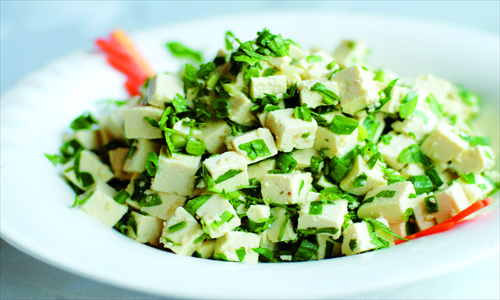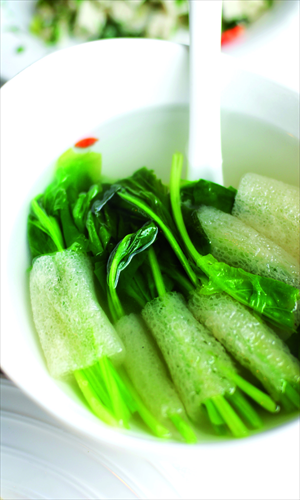HOME >> METRO BEIJING
Veg out: Why Beijing’s traditional vegetarian restaurants are becoming less popular
By Wang Shutong Source:Global Times Published: 2012-2-16 20:10:03


Just a few dishes that you can expect to get in a traditional vegetarian restaurant Photos: CFP
Stepping into a vegetarian restaurant near Chaoyangmenwai Dajie SOHO, we are greeted by nice décor but few people. It is a weekend afternoon and most tables are unoccupied. This is in stark contrast to a normal Chinese restaurant opposite, where dozens are waiting inside, their ears pricked to hear the waitress calling their number so that they can sit and eat.
There is reason for this. Speaking on the subject, Gao Wei, the secretary general of Beijing Folk Society, said that most of Beijing's traditional vegetarian restaurants have closed due to dwindling popularity. "Compared with people who eat meat, vegetarians are still a minority," Gao said. "And young people dislike the old-fashioned dishes." But is this completely correct?
"Quansu Liu" (Liu Wencheng), a cook who specializes in cooking old traditional vegetarian food and whose grandfather was an imperial chef in the Qing Dynasty (1644-1911) during Emperor Guangxu's reign, agrees. "Many vegetarian restaurants focus on new style vegetarian dishes," Liu said. "They want to make dishes fashionable in order to attract young people, and so the main ingredients they use are totally different from the traditional ones."
Liu believes that traditional ones have a place. "Though traditional vegetarian food receives less coverage in the catering industry compared to new ones, many people like it and it won't disappear in the future." However, some alterations are necessary.
In order to boost the gloomy prospect of the traditional vegetarian food business, Liu has just opened a restaurant named Zhuanyuanlou in Donghuamen Dajie and on the menu you can see many old Beijing traditional vegetarian dishes. "We preserve the original taste of traditional vegetarian food. Compared to new vegetarian restaurants that use soybean protein as the main ingredient, which tastes a little bit bitter and hard, our dishes taste softer and sweeter," Liu said. But there have been some updates to fit in with the new climate. According to Liu, "the food now contains less oil and it's healthier."
Traditional vegetarian food has not always been out of fashion. In fact, vegetarian food actually had a moment in the late years of the Republic of China (1912-1949). There were apparently more than 10,000 restaurants in Beijing, among which around 700 made vegetarian food, seven percent of the catering industry at that time. Buddhism and health considerations contributed a lot to the cuisine's popularity.
So why did a once thriving business retreat? According to Liu, old vegetarian food has several problems. For one, the cooking process is complex. "Close attention is paid to the taste and ingredients, thus every step is really important," Liu explained. "In order to make the food taste more like meat, a soup is used and it needs to boil for hours. This is only one step among hundreds."
Liu also added that young people now are after a good working environment, which he believes you don't get in a traditional vegetarian kitchen because it involves a lot of frying, which generates a lot of smoke. Furthermore the old-fashioned dishes of traditional vegetarian food also scare people away. "Young people prefer new things," Liu said.
Traditional vegetarian restaurants have also been given a run for their money by new-age vegetarian establishments. Different from traditional vegetarian food, the food is less oily and uses fresher ingredients. The restaurant environments are also often more cozy and fashionable. 29-year-old Tang Yunlu from Sichuan Province became a vegetarian two years ago and said that she prefers this type of vegetarian food. "People from my generation pay attention to animal protection and environment-friendly issues," she said. "Unlike Godly (a time-honored vegetarian restaurant that opened in 1922) for example, which has a close connection to Buddhism and a lack of choice, the new vegetarian places have more options and allow people that don't believe in Buddhism to eat vegetarian food in a fashionable environment."
Tang, who has tried foreign vegetarian dishes at Middle Eastern and Indian restaurants but prefers Chinese ones, expressed that new vegetarian food will become even more popular in the future since more young people are becoming vegetarian.
Besides eating and cooking vegetarian food, Tang also published a magazine online named Yuansu to publicize the advantages of being a vegetarian. "It explains how animals release many toxins when being killed and those toxins have bad effects on the body. So eating vegetarian food can make you feel good, which is important for people who are working under pressure nowadays," Tang said.
Eileen Wen Mooney, a Beijing-based food critic who published the book Beijing Eats about food and dining in Beijing, gave her thoughts on the city's vegetarian food. In Wen Mooney's opinion, traditional ones emphasize presentation too much. "They want to turn meat-less food into the shape of a chicken or something else and make it taste like meat too. For people like me who want to eat original tasting vegetarian food, it's too much. Why don't we just eat meat?" she explained.
Compared with Beijing vegetarian food, Wen Mooney prefers Taiwanese vegetarian food since it concentrates more on taste. There is a good explanation behind this. "In Beijing they can't get good ingredients since vegetables are grown with hormones now. They are larger but taste worse," she notes. According to Tang, the cost of vegetarian food is big and thus in the long run, vegetarian restaurants will have limited profit. This may explain why many restaurants are opting for processed vegetables over organic in order to save costs.
There is reason for this. Speaking on the subject, Gao Wei, the secretary general of Beijing Folk Society, said that most of Beijing's traditional vegetarian restaurants have closed due to dwindling popularity. "Compared with people who eat meat, vegetarians are still a minority," Gao said. "And young people dislike the old-fashioned dishes." But is this completely correct?
"Quansu Liu" (Liu Wencheng), a cook who specializes in cooking old traditional vegetarian food and whose grandfather was an imperial chef in the Qing Dynasty (1644-1911) during Emperor Guangxu's reign, agrees. "Many vegetarian restaurants focus on new style vegetarian dishes," Liu said. "They want to make dishes fashionable in order to attract young people, and so the main ingredients they use are totally different from the traditional ones."
Liu believes that traditional ones have a place. "Though traditional vegetarian food receives less coverage in the catering industry compared to new ones, many people like it and it won't disappear in the future." However, some alterations are necessary.
In order to boost the gloomy prospect of the traditional vegetarian food business, Liu has just opened a restaurant named Zhuanyuanlou in Donghuamen Dajie and on the menu you can see many old Beijing traditional vegetarian dishes. "We preserve the original taste of traditional vegetarian food. Compared to new vegetarian restaurants that use soybean protein as the main ingredient, which tastes a little bit bitter and hard, our dishes taste softer and sweeter," Liu said. But there have been some updates to fit in with the new climate. According to Liu, "the food now contains less oil and it's healthier."
Traditional vegetarian food has not always been out of fashion. In fact, vegetarian food actually had a moment in the late years of the Republic of China (1912-1949). There were apparently more than 10,000 restaurants in Beijing, among which around 700 made vegetarian food, seven percent of the catering industry at that time. Buddhism and health considerations contributed a lot to the cuisine's popularity.
So why did a once thriving business retreat? According to Liu, old vegetarian food has several problems. For one, the cooking process is complex. "Close attention is paid to the taste and ingredients, thus every step is really important," Liu explained. "In order to make the food taste more like meat, a soup is used and it needs to boil for hours. This is only one step among hundreds."
Liu also added that young people now are after a good working environment, which he believes you don't get in a traditional vegetarian kitchen because it involves a lot of frying, which generates a lot of smoke. Furthermore the old-fashioned dishes of traditional vegetarian food also scare people away. "Young people prefer new things," Liu said.
Traditional vegetarian restaurants have also been given a run for their money by new-age vegetarian establishments. Different from traditional vegetarian food, the food is less oily and uses fresher ingredients. The restaurant environments are also often more cozy and fashionable. 29-year-old Tang Yunlu from Sichuan Province became a vegetarian two years ago and said that she prefers this type of vegetarian food. "People from my generation pay attention to animal protection and environment-friendly issues," she said. "Unlike Godly (a time-honored vegetarian restaurant that opened in 1922) for example, which has a close connection to Buddhism and a lack of choice, the new vegetarian places have more options and allow people that don't believe in Buddhism to eat vegetarian food in a fashionable environment."
Tang, who has tried foreign vegetarian dishes at Middle Eastern and Indian restaurants but prefers Chinese ones, expressed that new vegetarian food will become even more popular in the future since more young people are becoming vegetarian.
Besides eating and cooking vegetarian food, Tang also published a magazine online named Yuansu to publicize the advantages of being a vegetarian. "It explains how animals release many toxins when being killed and those toxins have bad effects on the body. So eating vegetarian food can make you feel good, which is important for people who are working under pressure nowadays," Tang said.
Eileen Wen Mooney, a Beijing-based food critic who published the book Beijing Eats about food and dining in Beijing, gave her thoughts on the city's vegetarian food. In Wen Mooney's opinion, traditional ones emphasize presentation too much. "They want to turn meat-less food into the shape of a chicken or something else and make it taste like meat too. For people like me who want to eat original tasting vegetarian food, it's too much. Why don't we just eat meat?" she explained.
Compared with Beijing vegetarian food, Wen Mooney prefers Taiwanese vegetarian food since it concentrates more on taste. There is a good explanation behind this. "In Beijing they can't get good ingredients since vegetables are grown with hormones now. They are larger but taste worse," she notes. According to Tang, the cost of vegetarian food is big and thus in the long run, vegetarian restaurants will have limited profit. This may explain why many restaurants are opting for processed vegetables over organic in order to save costs.
Posted in: Metro Beijing